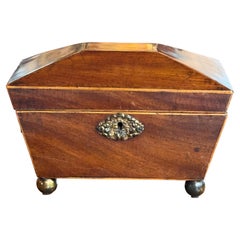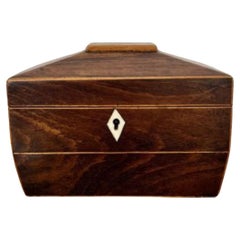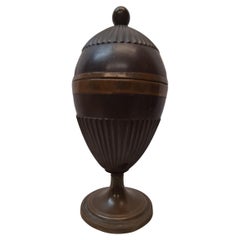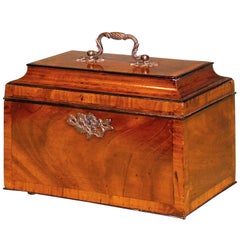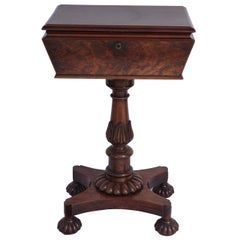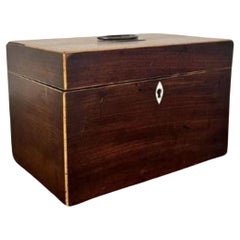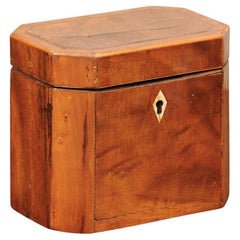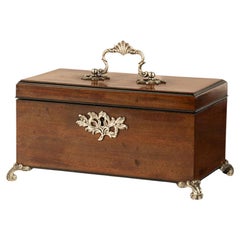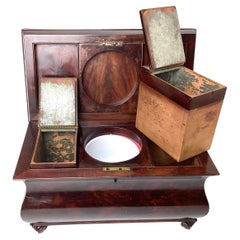Antique Mahogany Tea Caddy
19th Century English Antique Mahogany Tea Caddy
Mahogany
Early 19th Century George III Antique Mahogany Tea Caddy
Mahogany
Late 18th Century British Antique Mahogany Tea Caddy
Mahogany
Mid-18th Century Great Britain (UK) Chippendale Antique Mahogany Tea Caddy
Mahogany
19th Century English Antique Mahogany Tea Caddy
Mahogany
19th Century George III Antique Mahogany Tea Caddy
Mahogany
Late 18th Century English George III Antique Mahogany Tea Caddy
Mahogany
19th Century English George III Antique Mahogany Tea Caddy
Mahogany
19th Century English Regency Antique Mahogany Tea Caddy
Mahogany
19th Century British Antique Mahogany Tea Caddy
Mahogany
19th Century British Georgian Antique Mahogany Tea Caddy
Wood
1790s English George III Antique Mahogany Tea Caddy
Mahogany
19th Century American Antique Mahogany Tea Caddy
19th Century English Regency Antique Mahogany Tea Caddy
Other
19th Century English Regency Antique Mahogany Tea Caddy
Bronze
Early 19th Century English Regency Antique Mahogany Tea Caddy
Mahogany
Late 18th Century English George III Antique Mahogany Tea Caddy
Boxwood, Mahogany, Rosewood
Late 18th Century English Sheraton Antique Mahogany Tea Caddy
Mahogany
Mid-18th Century English Georgian Antique Mahogany Tea Caddy
Mahogany
1830s English William IV Antique Mahogany Tea Caddy
Mahogany
Mid-18th Century English George III Antique Mahogany Tea Caddy
Mahogany
Early 19th Century English Regency Antique Mahogany Tea Caddy
Mahogany
19th Century English Chippendale Antique Mahogany Tea Caddy
Silver Plate
Late 18th Century English Georgian Antique Mahogany Tea Caddy
Mahogany
Late 18th Century English Georgian Antique Mahogany Tea Caddy
Mahogany
Late 18th Century European Antique Mahogany Tea Caddy
Brass
Early 19th Century English Regency Antique Mahogany Tea Caddy
Mahogany
Early 19th Century English William IV Antique Mahogany Tea Caddy
Mahogany
1790s English George III Antique Mahogany Tea Caddy
Mahogany
1820s British Regency Antique Mahogany Tea Caddy
Wood
Early 19th Century Regency Antique Mahogany Tea Caddy
Bone, Mahogany, Satinwood, Holly
1880s British Victorian Antique Mahogany Tea Caddy
Wood
Late 18th Century English George III Antique Mahogany Tea Caddy
Wood
17th Century Antique Mahogany Tea Caddy
Mahogany
19th Century British Antique Mahogany Tea Caddy
Brass
Late 18th Century British Antique Mahogany Tea Caddy
Mahogany
Mid-19th Century Empire Antique Mahogany Tea Caddy
Glass, Cut Glass, Mahogany
Early 19th Century English Regency Antique Mahogany Tea Caddy
Mahogany
Early 19th Century English Regency Antique Mahogany Tea Caddy
Mahogany
1780s English Georgian Antique Mahogany Tea Caddy
Wood
Early 20th Century English Georgian Antique Mahogany Tea Caddy
Brass
Early 19th Century English Regency Antique Mahogany Tea Caddy
Mahogany
Late 18th Century English Georgian Antique Mahogany Tea Caddy
Mahogany
Early 18th Century English George II Antique Mahogany Tea Caddy
Mahogany
Early 19th Century English Regency Antique Mahogany Tea Caddy
Brass
19th Century English Regency Antique Mahogany Tea Caddy
Other
1840s British Victorian Antique Mahogany Tea Caddy
Wood
19th Century English Antique Mahogany Tea Caddy
Crystal
1890s English Antique Mahogany Tea Caddy
Mahogany
19th Century British Campaign Antique Mahogany Tea Caddy
Brass
Late 18th Century English Georgian Antique Mahogany Tea Caddy
Mahogany
Late 18th Century English Chippendale Antique Mahogany Tea Caddy
Brass
1840s British Victorian Antique Mahogany Tea Caddy
Wood
Early 19th Century English Georgian Antique Mahogany Tea Caddy
Mahogany, Satinwood
Late 18th Century English Georgian Antique Mahogany Tea Caddy
Mahogany
19th Century English Regency Antique Mahogany Tea Caddy
Mahogany
Early 19th Century English Regency Antique Mahogany Tea Caddy
Velvet, Cut Glass, Boxwood, Mahogany, Satinwood
- 1
Antique Mahogany Tea Caddy For Sale on 1stDibs
How Much is a Antique Mahogany Tea Caddy?
Finding the Right Tea-caddies for You
There are lots of uses for your vintage, new or antique tea caddies, but they can certainly serve their original intended purpose if needed.
When tea first gained popularity during the 1800s, and teatime became commonplace in homes all over England, it was an expensive commodity owing to excessive taxation. (This, of course, inevitably yielded a black market for tea leaves.) Tea drinkers hoarded their precious goods, which began to arrive in London ports from China during the 17th century, under lock and key. In luxury homes, tea leaves were stowed away in a decorative jar or canister called a tea caddy that was fitted with a lock, or, alternatively, the container was kept in a secured chest or storage cabinet.
Tea was thought to be not just a delicious drink but also to have medicinal benefits. The Chinese had been praising the healthy properties of tea, and wealthy Europeans were eager to discover its benefits for themselves during their ritual afternoon tea. The idea of “teatime” wasn’t a social event in upper-class British homes until the 1830s or 1840s. During Queen Victoria’s reign, small baked treats might be served with your beverage, and teakettles and coffeepots were part of tea services that could include teacups, saucers, a milk pot and other accessories.
When tea cultivation was relegated to British colonies such as India, and the British East India Company could no longer hold onto its trade monopoly with China, tea was no longer a ritual confined to the wealthy. Today, antique and vintage tea caddies are collector’s items all over the world.
Tea caddies weren’t unique to Europeans. The earliest pieces originated in China. Surviving hand-painted examples from China or elsewhere in Asia made of porcelain might feature enameled landscapes or other designs. At the Taft Museum of Art, there are striking enameled 18th-century-era tea caddies of copper that were given to the institution in 2014. Wooden tea caddies materialized over time and were seen as sturdier than their ceramic counterparts.
Today, there are all kinds of ways to use a vintage tea caddy if you’re passing on tea. They’re a welcome decorative flourish on the mantel in your living room, for example. A metal tea caddy, lined with a plastic bag, can be used to cultivate an herb garden on your kitchen windowsill. An old wooden tea caddy can help keep your paper clips or pushpins organized on your desk too. If you’re always on the go, a tea tin is good for packing earbuds, hand sanitizer, gum or whatever else that might get easily lost in a roomy crossbody messenger bag or other shoulder bag.
Teatime or not, find antique and vintage mid-century modern tea caddies, tortoiseshell caddies and more on 1stDibs.
Read More
How a Craving for Color Revolutionized Glass
After synthetic dyes changed fashion, home goods and printed matter, it was only a matter of time till glass caught up.
Kazuyo Sejima’s Flowering Tree Blooms Year-Round
The brilliantly simple design turns a modest bouquet into a major statement.
He Wrote ‘Oedipus Rex,’ but Do You Know What He Looked Like?
The Greek tragedian is said to have been handsome in his day.
Cigar Culture Was Once the Peak of Masculinity. Now, It’s a Compelling Curiosity
Even for those who don’t indulge, elegant smoking accessories and audacious art portraying cigar enthusiasts hold a nostalgic allure.
African Travel Plans on Hold? This Ardmore Leopard Vase Brings the Beauty of the Savanna to You
It’s an excellent example of the sought-after ceramics coming out of South Africa’s KwaZulu-Natal province.
With a High-Tech Flagship and Cool Collabs, Lladró Is Breaking the Mold for Porcelain Production
Thanks to its new leadership, the Spanish maker of figurines, busts and lighting is on a mission to update the art of porcelain for the 21st century.
Zoë Powell’s Magnolia 05 Vessel Is Handmade from Clay She Unearthed Herself
The free-form stoneware piece is inspired by the magnolia tree and its associations with home.
8 Ways to Breathe New Life into a Space with Plants
The pair behind the Instagram account @houseplantclub share their tips for making any room of the house gloriously green.
